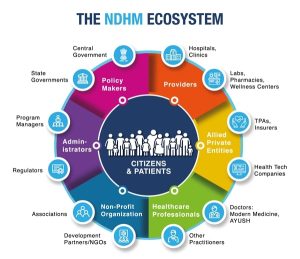30 Sep National Digital Health Mission and the real challenges in the health care sector in India (GS 3, Economics, The Hindu, Indian Express)
Background: The National Health Policy 2017 provisioned for the creation of a digital health technology ecosystem for the development of an integrated health information system, which could serve the needs of all stakeholders and improves citizens with public and private health care along with better efficiency and greater transparency. Later in July 2019, a committee headed by J Satyanarayana, the former Chairman Unique Identification Authority of India, released the National Digital Health Blueprint, recognized the need to establish a specialized organization, called the National Digital Health Mission (NDHM), to facilitate the evolution of the National Digital Health Ecosystem.
National Digital Health Mission (NDMH) was announced by the Prime Minister on 74th Independence Day. Its salient feature is that every citizen will have an option to get a 14 digit health identification number on a voluntary basis. This ID will carry a digital repository of their medical history. The digital platform of NDMH will also provide the facilities of Digi Doctor and Health Facility Registry. e-Pharmacy and Telemedicine will also be included later on.
Digi Doctor – Under the Digit Doctor option doctors will get enrolled on a voluntary basis and will be assigned digital signatures to write prescriptions for the patients. It is kept as voluntary for the doctors and hospitals.
Health ID – Every citizen who wishes, needs to create a unique health ID Using Aadhar or mobile number. These health ID will be linked to a health data consent manager which will take the the patient’s consent and will provide health information on the basis of the personal record of that patient. Various Health Care providers like hospitals, online pharmacies telemedicine, Laboratories, Insurance companies are expected to participate in the digital health ecosystem.
The health ID will have all records of diseases, tests, doctors visited, diagnosis done, and medicines taken, etc. This implies that a patient won’t be needing to carry the health reports. The doctors will be also well informed which will be valuable for a better diagnose. Using a person’s basic details like Aadhar and mobile number, this ID will be created and presumably, there will be an app as a convenient interface. It sounds smart and attractive. But the real question is, whether data availability is the only thing that is hindering the provisioning of high-quality and affordable health care in India.
Challenges: The challenge of healthcare in India in the light of experience with the coronavirus pandemic and decades of research can be defined quite simply. These can be termed as lacking in beds and hospitals, lacking in trained staffs,a huge number of patients per doctor, the large size of population especially rural population, finding and buying appropriate drugs and treatment, competing systems of medicine, cost of research etc.
The Other challenges are regarding the absence of privacy law regarding personal health data and little public awareness and control over their data, which could be open to misuse. These data, if got by large private insurance companies could be misused and can make access to affordable insurance difficult. Through this data information, the public and private health resources could be prioritized to rich demographics who can afford a high premium rather than to those who cannot pay as that much.
Way Forward : As prescribed in draught National health policy 2015 there is a need to recognise health as justiciable right. Data security and privacy of patients is one of the biggest concerns. Hence there is a need to ensure that the health records of patients remain secure and entirely confidential. Prior to the launching of this mission on a pan India basis, the technical and implementational deficiencies must be addressed.
Health comes under the concurrent list and that’s why there would be a need to find ways to accommodate state-specific rules. It will be better if it gets sink with other government schemes like Aayushman Bharat Yojana, NIKSHAY, Reproductive Child Health Care etc. Thus it is crucial to fix the fundamentals from the ground for the success of the National Digital Health Mission.
Md Layeeque Azam, Economics Faculty
Download Plutus ias Current Affairs 30 setember 2021
Plutus IAS Current Affairs Team Member




No Comments